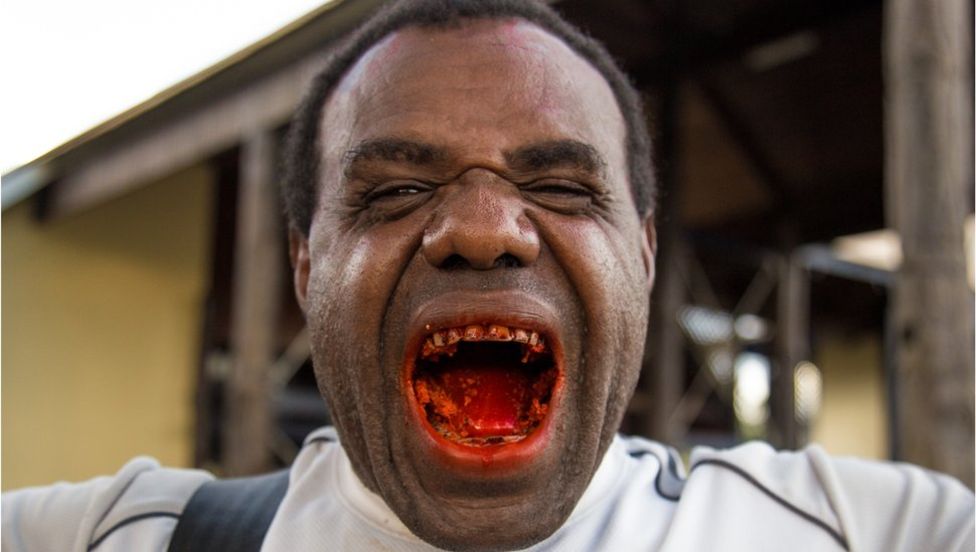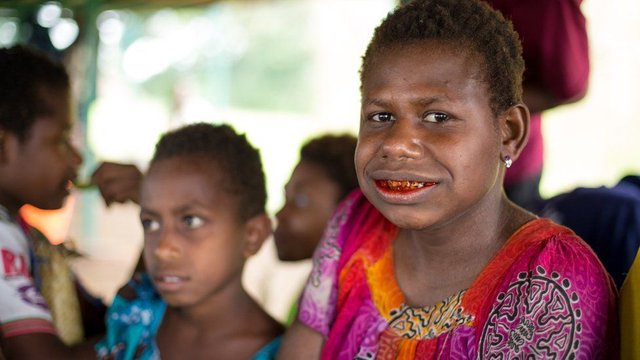Is the traditional chewing of Betel nut killing Papua New Guinea?

In Papua New Guinea, the popularity of the psychoactive betel nut is on the rise. With mouth cancer rates soaring, the nation is struggling to control its growing addiction.
Once reserved for sacred events, now almost half of Papua New Guineans chew betel nut.
It is common for children as young as six to chew it, and addicts admit using the drug every day from morning to night.
The chewing of betel nut, the seed of the Areca palm, is common across Asia and the Pacific.
In Papua New Guinea, where it is known locally as "buai", it is consumed with a mustard stick dipped in slaked lime powder.
Chewed then spat out, it creates a sense of euphoria and alertness.
Customary practice
At an annual cultural festival in East New Britain province, the tell-tale signs of betel nut chewing are ubiquitous. Spittle and shells litter the ground, as men, women and older children laugh and chatter with lips stained bright red.
A clan from the Baining mountains are performing, and Philomena has travelled with them alongside her five children aged eight to 18 years. They are all chewing betel nut.
As Philomena chews her eyes widen and she begins to sweat. "It is a stimulant, it gives you a high feeling and keeps you going when you are becoming bored." Then a jet of red spit shoots from her mouth.
Gesturing with her hands, she speaks louder, "Now I am chewing it energises me. I have been psyched up.
"If my children want to chew buai, they can. But they must make sure they eat first. If you don't eat and you chew, it makes you dizzy."
Her daughter Sophia, who is 18, has been chewing since she was 10 years old. As she speaks, she swirls the red mush around her mouth, giving her a lisp.
"Chewing buai makes me happy and gives me extra energy to complete my errands. Without the buai we would be tired and sleepy. It's part of our culture. Everyone in the family chews buai."
'Like a cup of tea'
Betel nut's active ingredient, arecoline, acts on the same receptor proteins in the brain as nicotine. It is highly addictive and also a carcinogen.
Papua New Guinea has the highest rate of oral cancers in the world. According to the World Health Organisation, nearly one in every 500 new cases of mouth and oropharynx cancer is in Papua New Guinea and it is the nation's biggest cancer killer.

Dr Yvonne Sapuri, who diagnoses approximately two new cases of oral cancer weekly at the Kimbe General Hospital in West New Britain, fears these figures are hugely underestimated.
"Our statistics are not very accurate and a lot of cases go undiagnosed. I have noticed a big increase in the number of suspected cancer patients with mouth lesions."
This in a country with limited and healthcare facilities, frequent drug shortages and few oncologists. At Papua New Guinea's only specialist cancer centre, radiotherapy treatments were put on hold after its only radiation specialist resigned last year.
Not indicating that the content you copy/paste is not your original work could be seen as plagiarism.
Some tips to share content and add value:
Repeated plagiarized posts are considered spam. Spam is discouraged by the community, and may result in action from the cheetah bot.
Creative Commons: If you are posting content under a Creative Commons license, please attribute and link according to the specific license. If you are posting content under CC0 or Public Domain please consider noting that at the end of your post.
If you are actually the original author, please do reply to let us know!
Thank You!
Hi! I am a robot. I just upvoted you! I found similar content that readers might be interested in:
http://wasabi-now.com/article/c42bcc541b8e1233806b9c4c94ede994